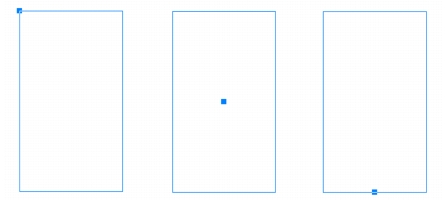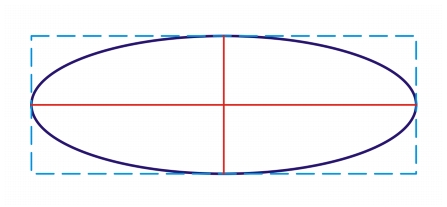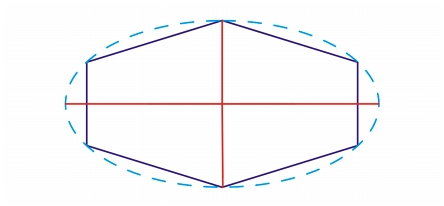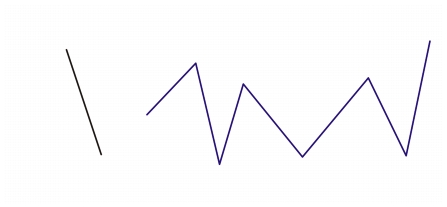
Quick links to procedures on this page:
• |
• |
• |
• |
• |
• |
• |
• |
You can use the Object coordinates docker to draw and modify shapes and lines with precision. The live preview in the drawing window lets you see the effects of your adjustments.
You can type coordinate values to specify the exact position, dimensions, and angle of rotation of an object. You can also set object attributes interactively by dragging in the drawing window.
To draw a rectangle with precision, you can specify an origin point, which is one of nine points in the rectangle (four corner points, four midpoints, and one center point). If you rotate the rectangle, the origin point is used as the center of rotation. You can also specify the angle of rotation, and the width and height of a rectangle.
If the angle of rotation is 0, you can specify the position of the lower-left and upper-right corners of the rectangle.
To draw a square, you can specify the origin point, the length of a side, and an angle of rotation.

Left: The origin point of a rectangle appears as a blue node in the live preview. You can select the center point, or any corner or midpoint, as the origin point.
To draw an ellipse with precision, you can specify an origin point, which is one of nine points in the bounding box that can be drawn around the ellipse. The origin point is used as the center of rotation.
You can also specify the ellipse diameters, which are the width and height of the bounding box around the ellipse, and the angle of rotation. If the angle of rotation is 0, you can specify the exact position of the lower-left and upper-right corners of the bounding box around the ellipse.
To draw a circle, you can specify the origin point, diameter, and angle of rotation.

You can specify the width and height of the bounding box that can be drawn around an ellipse.
To draw a polygon, you can specify the number of sides, the angle of rotation, or the center and diameters of the bounding ellipse that can be drawn around the polygon. The center of the bounding ellipse, also known as the “polygon center,” is used as the center of rotation.
You can also draw regular polygons with precision. All sides of a regular polygon are of equal length. You can specify the side length and angle of rotation, or the center and diameter of the bounding circle that can be drawn around the regular polygon.

You can specify the diameters of the bounding ellipse that can be drawn around the polygon.
You can draw a straight line by using one of two methods. With the first method, you specify the start point and endpoint of the line. With the second method, you specify the start point and length of the line, plus an angle of rotation.
You can create complex lines by specifying the coordinates of multiple points. You can delete points, and you can modify the coordinates of existing points. After adding all the points you want, you can close the curved line by connecting its start point to its endpoint.

Straight and multipoint lines
You can use the Object coordinates docker to modify existing objects with precision. Note that when you modify an existing object, it is replaced with a new object. As a result, the following transformations and effects applied to the original objects are lost: envelope effects, rotations, and skew effects. In addition, any changes that were previously applied to the nodes on a polygon are lost.
| To draw or modify a rectangle by using object coordinates |
1. |
Click Window |
If you want to modify an existing rectangle, select the rectangle. |
2. |
Click the Rectangle button
|
3. |
Make any of the following adjustments:
|
• |
To set the origin point of the rectangle, click a point in the Origin area.
|
• |
To specify the exact position of the origin point, type values in the x and y boxes.
|
• |
To specify the width and height of the rectangle, type values in the Object size
boxes.
|
• |
To specify only the height or width of the rectangle and have the other
dimensions automatically adjusted in proportion, enable the Proportional check
box.
|
• |
To rotate the rectangle at a specified angle, type a value in the Angle of rotation
box. The origin point of the rectangle is used as the center of rotation.
|
4. |
Click one of the following:
|
• |
Create object — adds a new rectangle to the drawing window
|
• |
Replace object — replaces the selected rectangle with a new one
|
| To draw or modify a square by using object coordinates |
1. |
Click Window |
If you want to replace an existing square, select the square. |
2. |
Click the arrow at the bottom of the Rectangle button, and click the Square
button
|
3. |
Make any of the following adjustments:
|
• |
To set the origin point of the square, click a point in the Origin area.
|
• |
To specify the exact position of the origin point, type values in the x and y boxes.
|
• |
To specify the length of a side, type a value in the Object size box.
|
• |
To rotate the square at a specified angle, type a value in the Angle of rotation
box. The origin point of the rectangle is used as the center of rotation.
|
4. |
Click one of the following:
|
• |
Create object — adds a new square to the drawing window
|
• |
Replace object — replaces the selected square with a new one
|
| To draw or modify an ellipse by using object coordinates |
1. |
Click Window |
If you want to modify an existing ellipse, select the ellipse. |
2. |
Click the Ellipse button
|
3. |
Make any of the following adjustments:
|
• |
To set the origin point of the ellipse, click a point in the Origin area.
|
• |
To specify the exact position of the origin point, type values in the x and y boxes.
|
• |
To specify the diameters (width and height) of the ellipse, type values in the
Object size boxes.
|
• |
To specify only one of the diameters and have the other diameter automatically
adjusted in proportion, enable the Proportional check box.
|
• |
To rotate the ellipse at a specified angle, type a value in the Angle of rotation
box. The origin point of the ellipse is used as the center of rotation.
|
4. |
Click one of the following:
|
• |
Create object — adds a new ellipse to the drawing window
|
• |
Replace object — replaces the selected ellipse with a new one
|
| To draw or modify a circle by using object coordinates |
1. |
Click Window |
If you want to replace an existing circle, select the circle. |
2. |
Click the arrow at the bottom of the Ellipse button, and click the Circle button
|
3. |
Make any of the following adjustments:
|
• |
To set the origin point of the square, click a point in the Origin area.
|
• |
To specify the exact position of the origin point, type values in the x and y boxes.
|
• |
To specify the diameter of a circle, type a value in the Object size box.
|
• |
To rotate the circle at a specified angle, type a value in the Angle of rotation
box. The origin point of the circle is used as the center of rotation.
|
4. |
Click one of the following:
|
• |
Create object — adds a new circle to the drawing window
|
• |
Replace object — replaces the selected circle with a new one
|
| To draw or modify a polygon by using object coordinates |
1. |
Click Window |
If you want to modify an existing polygon, select the polygon. |
2. |
Click the Polygon button
|
3. |
In the Object size area, type a value in the Points or sides box.
|
4. |
Make any of the following adjustments:
|
• |
To rotate the polygon at a specified angle, type a value in the Angle of rotation
box.
|
• |
To specify the polygon center, type values in the x and y boxes in the Bounding
ellipse area. The polygon center is the center of the bounding ellipse that can be
drawn around the polygon. The polygon center is used as the center of rotation.
|
• |
To specify the diameters of the bounding ellipse around the polygon, type values
in the Object size boxes in the Bounding ellipse area.
|
• |
To specify only one diameter and have the other diameter automatically adjusted
in proportion, enable the Proportional check box.
|
5. |
Click one of the following:
|
• |
Create object — adds a new polygon to the drawing window
|
• |
Replace object — replaces the selected polygon with a new one
|
| To draw or modify a regular polygon by using object coordinates |
1. |
Click Window |
If you want to modify an existing polygon, select the polygon. |
2. |
Click the arrow at the bottom of the Polygon button, and click the Regular
polygon button
|
3. |
In the Object size area, type a value in the Points or sides box.
|
4. |
Type a value in the Side length box.
|
5. |
Make any of the following adjustments:
|
• |
To rotate the polygon at a specified angle, type a value in the Angle of rotation
box.
|
• |
To specify the polygon center, type values in the x and y boxes in the Bounding
circle area.
|
• |
To specify the diameter of the bounding circle around the polygon, type a value
in the Object size box.
|
6. |
Click one of the following:
|
• |
Create object — adds a new polygon to the drawing window
|
• |
Replace object — replaces the selected polygon with a new one
|
| To draw or modify a straight line by using object coordinates |
1. |
Click Window |
If you want to modify an existing line, select the line. |
2. |
Click the 2-point line button
|
3. |
To specify the start point and endpoint along the x and y rulers, type values in the
x and y boxes in the Points area.
|
In the live preview, the start point is highlighted. |
4. |
Click one of the following:
|
• |
Create object — adds a new line to the drawing window
|
• |
Replace object — replaces the selected line with a new one
|
| To draw or modify a multi-point line by using object coordinates |
1. |
Click Window |
If you want to replace an existing line with a new one, select the line. |
2. |
Click the Multi-point line button
|
3. |
Click the Add point button at the bottom of the Object coordinates docker.
|
4. |
Make either of the following adjustments:
|
• |
To specify the exact position of the point along the x and y rulers, type values in
the X and Y boxes.
|
• |
To add another point, click the Add point button
|
5. |
After specifying all the points you need, click one of the following:
|
• |
Create object — adds a new line to the drawing window
|
• |
Replace object — replaces the selected line with a new one
|
Use the following keyboard shortcuts to create a multi-point line quickly:
|
• |
To add a point, click in the Points area, and press Insert.
|
• |
To delete a selected point, press Delete.
|
• |
To activate the X or Y box of a selected point, press F2.
|
• |
To navigate through the X and Y boxes of the available points, select a
box and press Tab repeatedly.
|
• |
To navigate backward through the X or Y boxes of the available points,
select a box and press Shift + Tab repeatedly.
|
• |
To activate the Set point interactively button, double-click a point in
the docker.
|
|
|
Copyright 2012 Corel Corporation. All rights reserved.